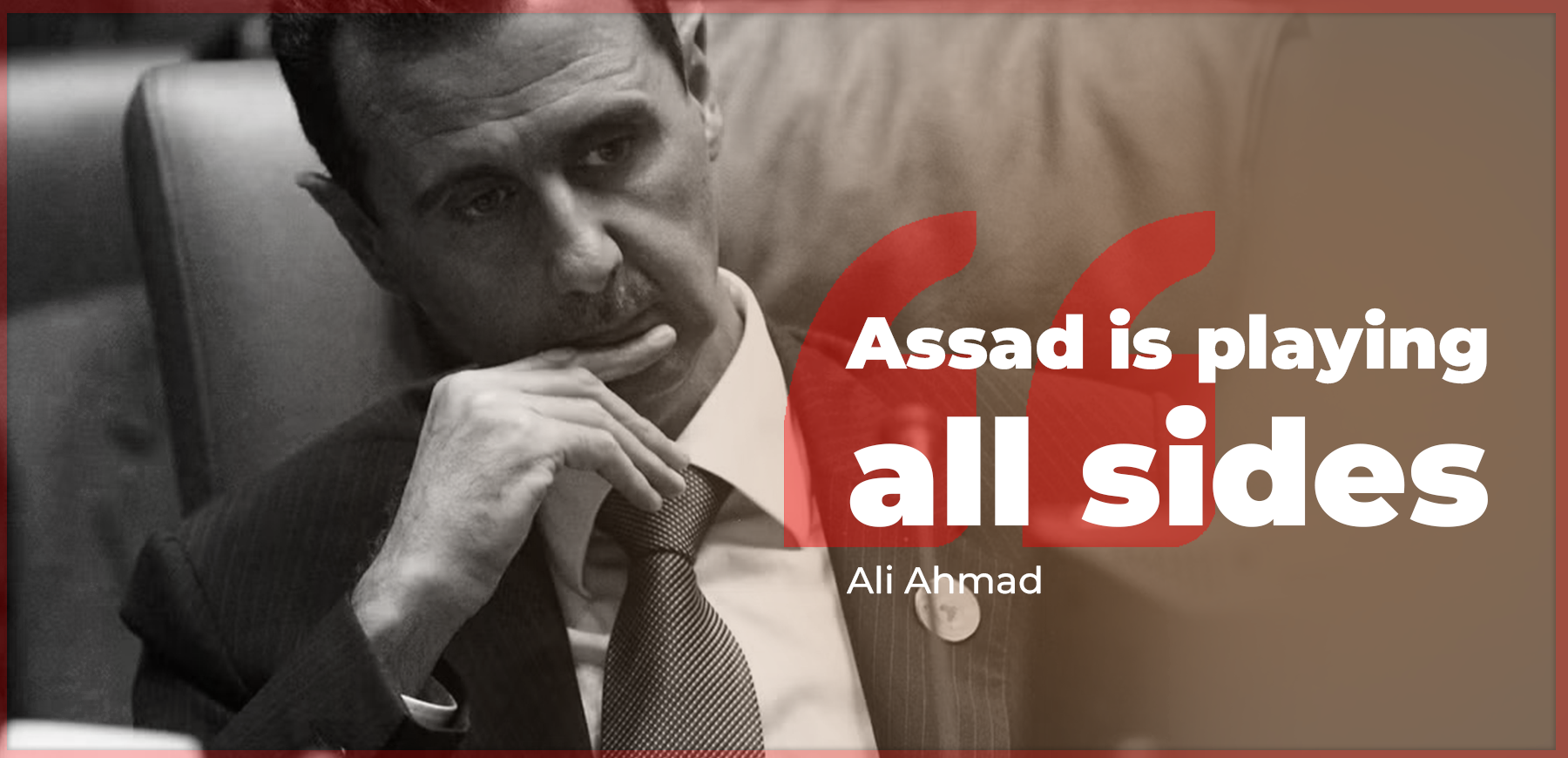
The Assad regime’s reticence to engage in the escalating conflict between Israel and Hezbollah is demonstrative of a growing distance between Damascus and Iran’s so-called “Axis of Resistance.” Despite its longstanding alliances with Hezbollah and Tehran, the regime in Damascus has remained conspicuously silent on Israel’s military actions in Gaza and Lebanon. More striking is its refusal to take even nominal steps to support the cause of “resistance,” whether through public statements, recruitment efforts, or direct involvement in the conflict.
Reserved Response
The regime’s failure to issue a strong, supportive stance on the nearly year-long war in Gaza or the recent Israeli attacks on Hezbollah leaders in southern Lebanon is telling. For almost a year, Israel’s military operations in Gaza have drawn sharp condemnations from other members of the “Axis of Resistance”, including Iran, Hezbollah, and various Palestinian factions. Yet, the Assad regime – once a vocal, if insincere, advocate for the Palestinian cause – has offered little more than muted rhetorical support.
Khalid Khalil, a Syrian author and analyst, notes that Damascus’ silence is particularly notable given his previous habit of responding with statements that aligned Syria with the broader anti-Israel front. “Five days before the assassination of Hezbollah leaders in the Beirut suburbs, Bashar al-Assad did not issue a statement or comment, distancing himself from attacks in southern Lebanon as he had done throughout the ongoing war in the Gaza Strip,” Khalil observes. This intentional inaction was noted by many as being a statement in itself.

Access Denied!
The regime’s reluctance to engage in Hezbollah’s ongoing war effort against Israel has been further solidified by its refusal to allow the group to recruit Syrian fighters. Despite Hezbollah’s critical role in defending his dictatorship throughout the revolution, Assad has shut down recruitment efforts aimed at bolstering Hezbollah’s southern front in Lebanon.
The closure of a Hezbollah recruitment office near the Sayyida Zeinab shrine by regime authorities in Damascus was a significant development. According to Khalil, Major General Kifah Melhem, head of the National Security Office, issued a directive for the immediate closure of the office. Stopping Hezbollah’s efforts to enlist Syrian volunteers to fight Israel. Yet Damascus rejected this move, citing concerns about “internal security” and the risk of “opening a new front with Israel.”
“Officers from the National Security Office visited Hajj Abu Ali Yasser, the party leader responsible for the recruitment office, to convince him to avoid any public recruitment activities,” Khalil writes. This decision underscores the regime’s cautious approach, as it seeks to avoid being drawn into a confrontation with Israel – a confrontation that could unravel the fragile stability it has painstakingly maintained over the past few years.
An Unreciprocated Alliance
Hezbollah’s involvement in Syria since 2011 has been pivotal to Assad’s survival, with its fighters serving as shock troops in some of the war’s most decisive battles and heinous massacres. Yet despite this critical partnership, recent actions suggest the regime is now distancing itself from Hezbollah’s ambitions in the region. As Khalil explains, “…despite the strategic partnership between the regime and Hezbollah in suppressing the Syrian revolution,” Assad has continuously failed to provide the same level of support and assistance to the group, inside and outside of Syria.

Survival Over Resistance
The regime’s reluctance to engage fully with the Axis of Resistance’s war efforts is rooted in a strategy of survival. After more than a decade of brutal conflict, economic collapse, and military exhaustion, its priority is not regional ambitions but self-preservation. As Ahmad notes, Assad is prioritizing internal stability over ideological alliances, even if it means distancing himself from his most crucial wartime ally.
Ahmad also highlights the delicate balance that must be maintained between Tehran, Moscow, and Damascus. While Iran pressures the regime to support Hezbollah and facilitate arms transfers to Lebanon, Russia has urged restraint, wary of any confrontation that might escalate into a broader conflict with Israel. Putin, keen to protect his geopolitical interests in Syria, has reportedly been instrumental in preventing the Golan Heights from becoming a new front in the Hezbollah-Israel conflict.
Ahmad’s analysis further suggests that Assad’s reluctance to engage stems from his calculation that Syria is “not equipped” to handle a direct military conflict with Israel. Pointing out that Israel’s continued targeting of Iranian and Hezbollah assets within Syria has only compounded the regime’s concerns. Israeli media reports have described efforts to intercept Iranian arms shipments through Syria, signaling that further Israeli operations in Syria are likely.
A Cowardly Calculus
Assad’s growing distance from the Axis of Resistance has become more apparent as Hezbollah increasingly focuses on defending its southern front in Lebanon. Hezbollah has reportedly withdrawn some of its forces from Syria to reinforce its positions in Lebanon amid the escalating conflict with Israel. More than 700 Hezbollah fighters have been redeployed from Syria, leaving only a minimal force to maintain the group’s strategic interests there.

By any means necessary
Ultimately, Assad’s silence and inaction regarding the ongoing conflicts in Gaza and Lebanon reflect a regime that is far more concerned with preserving its own stability than with ideological commitments to the Axis of Resistance. This couldn’t be more apparent than in its delays of condolence statements following Israel’s assassination of Hezbollah leader Hassan Nasrullah as noted by Voice of the Capital:
“All parties of the Axis of Resistance from Iran to Iraq, passing through Yemen and the Palestinian factions, issued statements of condolence and condemnation after the killing of the Secretary-General of the Hezbollah. Except for the Syrian regime its foreign ministry and its leaders.”
While alliances with Iran and Hezbollah remain intact, the regime has adopted a strategy of cautious disengagement, unwilling to risk its survival for a cause that could drag it into another devastating conflict. In the face of mounting Israeli attacks and growing Iranian pressure, Assad’s calculated quietude speaks volumes about his priorities.








